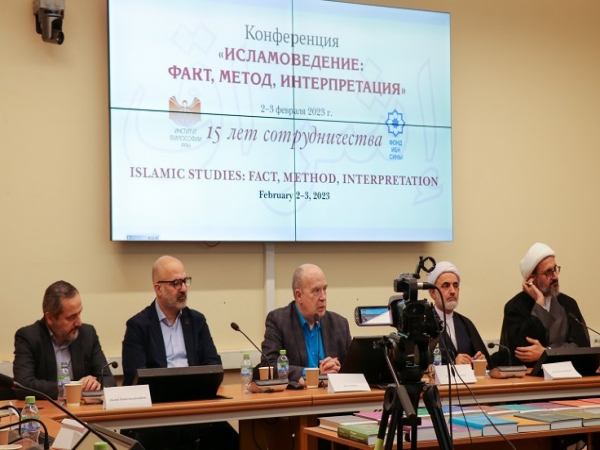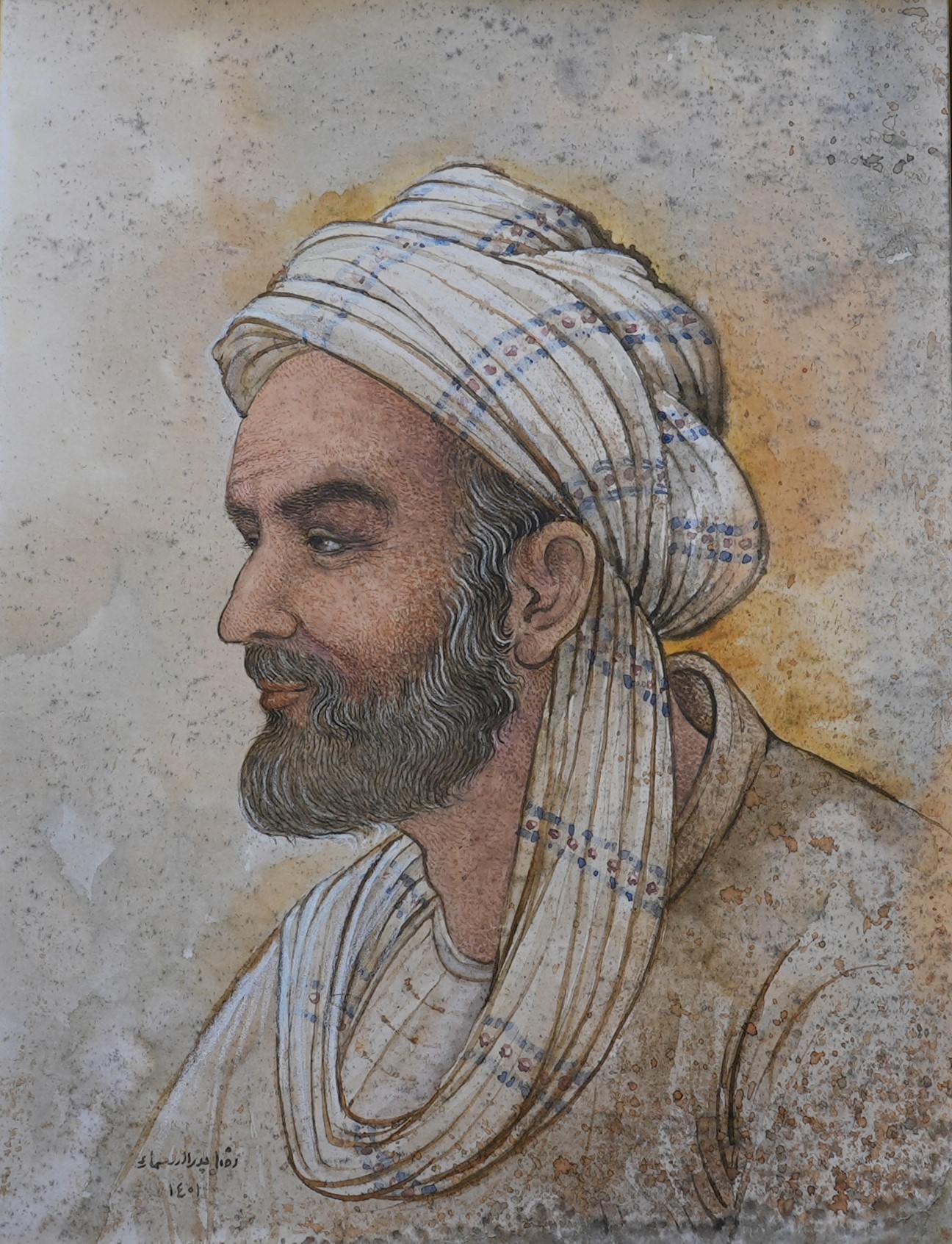The Institute of Philosophy of the Russian Academy of Sciences held a conference on “Islamic Studies: Fact, Method, Interpretation”. The event took place on February 2 and 3, 2023 in the Academic Council Hall.
The first day started with welcoming remarks by the following participants: academician A.A. Huseynov (acting director of the RAS Institute of Philosophy), academician A.V. Smirnov (acting first deputy director for research of the RAS Institute of Philosophy), Kazem Jalali (Ambassador Extraordinary and Plenipotentiary of the Islamic Republic of Iran to the Russian Federation) and H. Khadavimogaddam (President of the Ibn Sina Foundation). They noted that the Institute and the Foundation have a long-standing friendship and dozens of implemented projects and expressed their hope that the scientific and academic relations between Russia and Iran will grow and strengthen.
After that 9 scheduled lectures were delivered in the section “Method”.
1. Academician A.V. Smirnov delivered a lecture on “Philosophy and Orientalism”, where he explained how a modern scholar recognizes and distinguishes non-European cultures.
2. Ahmad Husain Sharifi, principal of the Qom University, gave a presentation on “Applied Ethics: Whatness and Foundations” and described how theoretical ethics can and should be applied in practice.
3. N. S. Kirabayev, professor at the Peoples’ Friendship University of Russia, spoke about the role of Russian academic schools in the development of historical and philosophical Islamic studies (second half of the 20th – beginning of the 21st century). He highlighted the contribution of the RAS Institute of Philosophy to the development of national Islamic studies.
4. Sayyid Ahmad Ghaffari from the Iranian Institute of Philosophy revealed the methodological foundations of contemporary Islamic studies. He described the current state of Iranian Islamic studies and presented his own programme.
5. Mohammad Javad Ismaili from the Iranian Institute of Philosophy spoke about “Traditional Philosophical Studies in Modern Iran” and explained how the Middle Eastern tradition of philosophical studies is currently continued by Iranian thinkers.
6. Bahadir Musametov, Associate at the Institute of History of Uzbekistan, presented a paper entitled “The Challenges of the Methodology of Academic Research in the Medieval Muslim World” that draws upon the works of Ibn Sina and Al-Farabi. He revealed the structure of medieval academic knowledge, showing its complexity and diversity.
7. R.V. Pshu, head of the Centre for the Study of Indian Philosophy and Culture “Puroshottama” at the Peoples’ Friendship University of Russia, outlined the history of the study of early Sufism. Having mentioned the main achievements of her European colleagues, she proposed her own approach to the re-definition of Sufi thought and its systematic description.
8. Davood Mehdizadegan introduced the Academic Publishing Centre for Humanities and Islamic Studies Initiatives “SAMT”. He expressed hope for cooperation with leading Russian research centres.
9. I.R. Nasyrov, leading researcher at the RAS Institute of Philosophy, spoke about the importance of interdisciplinary interaction between different humanities. He expressed his opinion stating that a true scientist must check his own theories with practice and evidence of studied traditions.
The signing of Memoranda of Cooperation between the Institute of Philosophy, the University of Qom and the Iranian Institute of Philosophy took place in between the presentations.
Six papers were presented in the “Fact&Interpretation” section on the second day of the conference.
1. A. Dirbaz, director of the Iranian Institute of Philosophy, presented his paper “Feminist Theology and the Nature of Women’s Influence on Family and Society”, criticized the contemporary “feminist theology” developed in the Jewish, Christian and Muslim traditions and defended the traditional view of the women’s position in society.
2. V. A. Drozdov, associate professor at St. Petersburg State University, in his presentation “The problem of authorship of medieval Persian works” presented a national project for studying medieval Persian works. In particular, he was able to identify the authorship of the Persian poem “The Treasures of the Mysteries”, attributed to Izz ad-Din Kashani, with the help of digital stylometry.
3. T.G. Korneeva and Y.E. Fedorova, researchers at the RAS Institute of Philosophy, spoke about the principles of tawhid developed by Nasir Khusraw and Farid ad-Din Attar. Thanks to a comparative analysis of Khusraw’s and Attar’s work, the authors were able to describe the uniqueness of Ismaili doctrine and Sufi mysticism.
4. I. R. Saitbattalov, associate professor at the Ufa University of Science and Technology, Bashkir State University, delivered a paper entitled “The Interpretation of Sufism in Turkic Literature of the Volga-Urals Region: Motives or Basis?”. According to the author, some elements of medieval Muslim mystical literature were adopted by prominent religious figures of the region, who reinterpreted the strict theoretical systems of Arabic and Persian Arifs. Sufi motifs discovered by the scholar and included in the “canon” of Bashkir culture still spark the interest of experts in religion and literature in the didactic works of the ulema of the Volga-Urals region.
5. A.A. Lukashev and F.O. Nofal, researchers at the RAS Institute of Philosophy, revealed the particularities of thinking about action in the Arabic and Persian cultures, in their presentation “The Metaphysics of Action in the Arabic and Persian Philosophical Traditions”.
6. Shirin Mohamad Alyusef, PhD student at the Peoples’ Friendship University of Russia, spoke about the biography and work of the Maghribi thinker and politician Ibn al-Azraq. According to Alyusef, in his concept of state Ibn al-Azraq managed to conciliate the provisions of fiqh with the achievements of modern Arab-Muslim thought.
The speeches were followed by a number of questions from the audience that resulted in a very interesting and lively discussion.
The event ended with a presentation of a series of works ‘Philosophical Thought in the Islamic World’ and ‘Ishrak’, a journal of Islamic philosophy, prepared by the Ibn Sina Foundation in cooperation with the RAS Institute of Philosophy. The presentation was timed to coincide with the 15th anniversary of the Department of Philosophy of the Islamic World of the RAS Institute of Philosophy.



